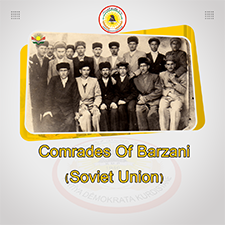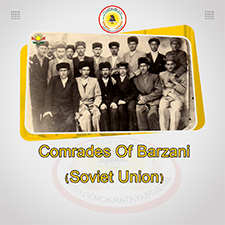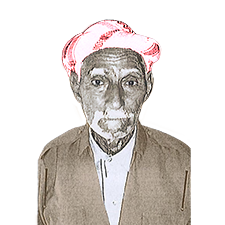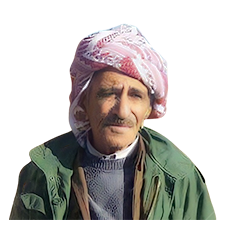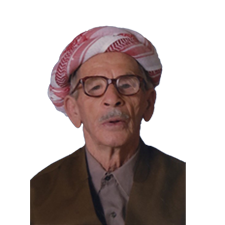Biography
Born in 1930 in Selkey village of Sherwan Mazin sub-district in Mergasor district in Erbil Governorate, his son named Jawahar Hussein was forcefully disappeared by the Iraqi government in the Erbil Governorate on 31 July 1983 in the Anfal operation of the Barzanis in the Harir community (1963-1983). Jawahar Hussein was martyred in the Battle of Matin mountain in 1963.
Memoir of struggle
After the outbreak of the Second Barzan Revolution in 1943, he joined the ranks of the revolution, and for this reason, on August 19, 1945; by order of the Military Court, all of his moveable and immoveable properties were seized.
On October 11, 1945, after the failure of the second Barzan Revolution, he crossed with Mustafa Barzani and his comrades to east of Kurdistan. After the establishment of the Kurdistan Democratic Republic in Mahabad on March 31st 1946 he defended the republic as part of the Barzan’s force.
After the collapse of the Kurdistan Republic in Mahabad and Barzani's return from the east of Kurdistan to the south of Kurdistan, he participated in the battle of the Saqiz Front in the east of Kurdistan. He was also one of the Peshmerga that in the 19/4/1947 through the route (Khwakwrk and the plains of Barazgirawa) of the northern Kurdistan territory returned to the Sherwan and Mzuri area.
After their return, General Mustafa Barzani on the 15/5/1947 in Argosh village meets his comrades and allows them to choose to stay, or go to the Soviet Union, where all his comrades decide to continue and go to the Soviet Union On May 23, 1947, he accompanied General Mustafa Barzani to the Soviet Union and participated in the stream of Qtor battle and the Battle of the Mako Bridge. After a lot of hardships and hard work, on June 18, 1947, crossed Aras River to Soviet which is located in the border between Iran and the Soviet Union.
After arriving in the Soviet Union, on June 19, 1947, with all his comrades in the Azerbaijani republic’s city of Nakhchawan, for forty days, they were in a desserted camp surrounded by barbwires, and guarded by soldiers, and regarding food, clothing, and mobility were treated as prisoners of war. Later, on the decision of the Soviet government, they were distributed over the areas of Aghdam, Lachin, Ayolakh and Kalbajar in the Republic of Azerbaijan. On 10 December 1947 they were transferred to a military base on the Khazar Sea in Baku, the capital of the republic of Azerbaijan, and were given military uniforms on 23rd of the same month and were trained for eight hours a day under the supervision of Azerbaijani officers. At the same time, for four hours a day, some of their comrades were taught Kurdish language lessons by some of their literate comrades.
After Jafaar Bakrov's ill treatment of his comrades, Barzani decides to move his military camp from the republic of Azerbaijan, on August 29, 1948, to the Chirchik camp near the "Tashkent" capital of Uzbekistan, where they will continue their military training.
In March 1949 he and his comrades were distributed as groups by train to the rural villages of the Soviet Union and worked in the kolkhoz farms (lands that the people took from the government and then paid back the government).
After a lot of effort and many letters from General Barzani sent to Stalin, finally a letter reaches Stalin’s hands in which Barzani talks about the problems of his comrades and Stalin immediately decides for a committee to be formed to investigate the situation of Barzani's comrades, and finally the decision of the committee is that they should all be gathered in the city of Vrivisky, so in November 1951 he goes to the Soviet city of Vrivsky.
Following the Revolution of July 14, 1958 in Iraq and the return of General Mustafa Barzani, on February 25، 1959, he and his comrades were subjected to general amnesty in accordance with the third and seventh articles and section (a) of the tenth Article and working with article (11) in accordance with the amended law No. 19 of 1959.
In 1958, the republic of Iraq was founded under the presidency of Abd al-Karim Qasim, and on April 16, 1959, the aforementioned returned to Kurdistan with his fellow comrades by the Groza ship through the port of Basra in the south of the republic of Iraq.
In 1961, he participated in the September Revolution and was the head of branch participated in the wars, and in 1963 he was martyred in the Battle of Mount Matin.
Sources:
ئهرشیفی دهستهی ئینسكلۆپیدیای پارتی دیموكراتی كوردستان




